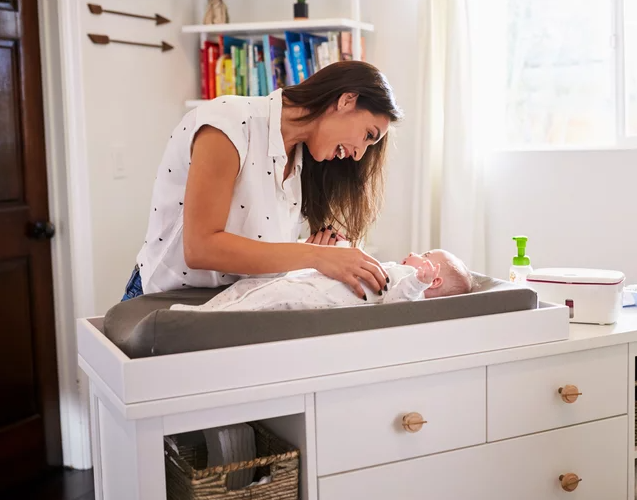
Baby Care: 2-3 Weeks Old Baby
2022-10-26 10:47
Baby Care: 2-3 Weeks Old Baby
At 2-3 weeks old, your baby will become more familiar. The sounds he makes, his eating and sleeping habits won't be so unfamiliar. Every day, your baby becomes more comfortable with their independent life. But you will be constantly reminded how vulnerable and dependent on you they are.

When their baby is about 2-3 weeks old, parents often feel relieved as the labor process finally ends. The excitement of pregnancy is over, and especially for women who love being pregnant, there can also be a sense of disappointment. Many women connect with a midwife or obstetrician and feel some grief when the relationship ends naturally.
Breastfeeding and Nipple Care
If you're breastfeeding, you and your baby may be struggling to find a rhythm. This is normal! For a lot of women, breastfeeding shouldn't be painful, and the simple standard comment that it should be is simply not true. Nipple tenderness can take weeks to stop, even if the baby is latched correctly. When the baby latches on, the initial discomfort and feeling of stretched nipple should stop as the feeding progresses.
Generally, ongoing pain, cracks, or trauma to the nipple are due to an incorrect latch. This needs to be addressed as early as possible with your healthcare provider to prevent further damage and to prevent complications.
Your breasts adjust to your baby's nutritional needs. Avoid trying to fit your baby into a feeding plan or routine at this early stage. Instead, pay attention to hunger cues and feed them according to their needs. Doing so will help your breast milk supply build up and reduce the chance of complications for either of you.
If you have problems latching your baby or any other feeding, talk to your healthcare provider or lactation consultant.
Sleeping
Your baby may still be sleeping and feeding most of the time. It is common for small infants to have several awake alert periods each day. Sometimes, your baby may cry for no reason, which can be very distressing for parents. While every baby is different, rocking, singing, rocking, cuddling, wrapping, pacifiers, or warm tubs are some of the more effective ways to help soothe your newborn.
At this age, most of your baby's energy will be devoted to feeding. If your baby is born prematurely, they may be sleepier than a full-term baby and you may need to wake them to feed. Jaundice, low birth weight, and pregnancy complications can also cause excessive sleepiness in the newborn.
The safest place for a 2 and 3-week-old to sleep is in their own bassinet or in a crib in their room. This way you can hear your baby and the baby can hear you. Babies can be noisy when they sleep. Grunting, moaning, whimpering, and walking around are common sleep behaviors and are considered normal.
Behavior
Some babies are active from birth, or are more sensitive, calm, or fussy than others. Every baby is different in temperament and personality, and sometimes it is very early to know what kind of little person they will become.
No doubt you will find yourself looking for similarities and differences between your baby and yourself. Genetics account for a large part of hereditary characteristics, but remember that your baby will be their own unique individual.

Diapers
Changing diapers will be one of the most repetitive and time-consuming tasks you will do with a newborn. Set up a changing area where everything you need is within easy reach and easy to clean.
Umbilical Cord Care
Your baby's umbilical cord may or may not come off at 2 or 3 weeks old. Your baby may still have a small raw area in the area of the belly button that connects to the umbilical cord. Sometimes, a small drop of blood may appear on your baby's diaper or clothes. Keep skin and umbilical cord clean and pat dry after bathing. Fold the top of the diaper down so that it is below the umbilical cord or belly button area, better advice is to buy NB size diapers.
Bathing
Bath time can be stressful, but it can also be a great time to bond and communicate with your baby. It will get easier and your baby will soon love the feel of the warm water and the time spent with you.
Physical Recovery
If you had a vaginal birth, you will find that your pain is lessened this week. Healing of the perineal area is usually quick. Although you may still have some bleeding called lochia for a few weeks, the amount of blood in the discharge should change from red to pink, then yellow or clear color. Call your doctor or midwife if you start to have blood clots, increased lochia, fever, pelvic pain, or smelly lochia.
If you've had a C-section or more severe perineal tear, your body will take longer to heal. Avoid exertion, driving, weight lifting, or sexual intercourse until your doctor agrees. The general recommendation is to delay these activities for six weeks after birth.
Your Emotions
Fatigue may have caught up with you. The euphoria and adrenaline that had been pumping you for the past few weeks is now relieving. It's important for new mothers to get as much rest and sleep as possible. When your baby naps, try to give yourself a break. Getting up several times at night can take a toll.
If you haven't taken a nap in years, you might want to try it now. And if you're breastfeeding, naps can help increase your milk supply.

Most new mothers experience at least a little "baby blues" after their baby is born. You may feel tearful, emotionally vulnerable, or even irritable and anxious. Infant blues are thought to be due to hormonal fluctuations after birth and usually last until the second week after birth.
This can add to an already stressful time if your labor and delivery doesn't go according to your plan, or if you don't feel like you're getting the support you want.
These hormonal fluctuations, along with fatigue and adjusting to changes in your relationship with your partner, all take time. Be kind to yourself and don't worry about being an expert in taking care of a newborn or getting everything done. It takes time, practice and a lot of patience. If something goes wrong, rely on your family and friends and call your midwife or doctor.
Your Partner
Your partner is likely to be your main support, both emotionally and practically. But if you don't tell them, they may not know how best to help you. Be specific about what you want them to do, and expect them to do something different than you.

No doubt the reality of having a baby this week will bring them home as well. The newborn period is usually a time when a partner tends to do housework, shopping, and running errands. If you're usually the person who does these things, you may need to know some details. Checklists are helpful for the whole family. This is your time to work smarter and save as much energy as possible while caring for your newborn.
Get the latest price? We'll respond as soon as possible(within 12 hours)
















